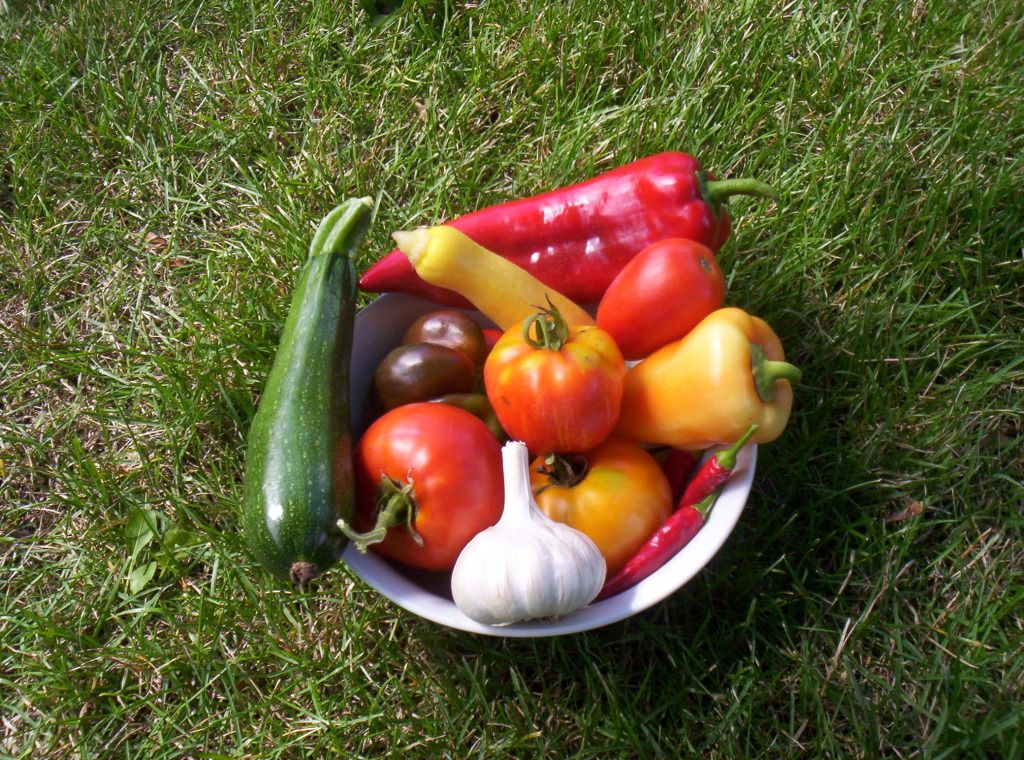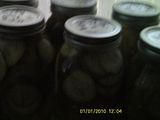Plant a Garden
I believe this is the easiest most effective form of activism a consumer can participate in.
Don't be controlled by a business suit's decision what foods you should eat.
Place your gardening tips here.
Tell a gardening story or post pics of your veggies!
You can also link canning/freezing and recipe information. ![]()
I will start out by giving a link to an Amish seeds site. The owner takes a written vow not to ship any genetically modified products.
http://www.amishlandseeds.com/index.htm
LaydeeBug
(10,291 posts)Siwsan
(26,314 posts)This is a photo of last year's bounty. My tip is I use landscaping fabric to cover the entire garden. Then I cut holes for the planting. Saves having to weed and helps keep moisture in the ground.

Blanks
(4,835 posts)I've been raising chickens for a couple of years now. Chicken tractors can be built and moved around in your yard very inexpensively. 4 chickens can be raised in a 4' x 4' enclosure and will produce between 2 to 4 eggs a day. Hens don't make much noise and can be fed kitchen scraps and will eat grass and most weeds.
If you've never considered raising chickens; you should look into it.
obxhead
(8,434 posts)I heard this on NPR the other day and it seems to work.
Storing your tomatoes stem side down will get them to last 3 to 4 days longer. It helps to keep the air out of the tomato slowing the decomposition process.
Too early for picks, but my tomatoes and watermelons have loved the heat. Tomato plants are nearly 6 feet tall and I'll probably get 20 to 30 watermelons this year! Can't wait to have my first rum filled watermelon with friends on the boat this year.
Siwsan
(26,314 posts)I have a big variety - several kinds of romas, some orange, yellow, purple, something called a black brandywine, and some heirloom that are always a fun surprise.
I also grow a nice variety of peppers, summer squash and my own garlic. This year I also planted some sweet dumpling squash, which is more of a 'winter' squash.
I will definitely try the upside down storage.
my son planted a fantastic little garden in a small corner of his yard.
[URL=http://s95.photobucket.com/albums/l147/SALTWN/?action=view¤t=Edsgarden2011.jpg][IMG] [/IMG][/URL]
[/IMG][/URL]
some of the results:
[URL=http://s95.photobucket.com/albums/l147/SALTWN/?action=view¤t=cucumberseds.jpg][IMG] [/IMG][/URL]
[/IMG][/URL]
note: I always forget to set the date on my camera so till I get a new one all my pictures will say jan 2010! ![]()
He had a late start and bug problems this year, but managed to salvage some things. I'll post pics as I get them.
jtuck004
(15,882 posts)There is almost nothing else that takes you away from being the hands, eyes, and arms of the tyrants like an organic garden. You can locally source virtually everything you need, and in the process almost remove yourself from their greedy, treasonous grasp, and their use of your talents.
I was reading the other day about the Victory garden program of WWII - iirc HALF of the produce eaten in U.S. homes during the war came from backyard gardens. The manual from that time even suggested that organic was the better way to grow - perhaps because they wanted the oil for the war, but it does reduce dependence on commercial fertilizer which takes massive quantities of natural gas to produce.
If you get a chance to read "Tomatoland", especially the parts where it talks about slavery in Florida in the production of tomatoes we get in stores TODAY, it is a great motivator to raise heirloom tomatoes and other veggies at home.
Gardening is a good skill to have. People think they can just move to avoid climate changes, but with just about an acre (ish) of arable land per person in the U.S., food (and the supermarket) may not be able to keep up.
And gardening provides the basis for better tasting food: http://politicook.net/2011/08/22/meatless-monday-my-garden-pea-pod-salad/
Thanks for this.
saltwn
(30 posts)Like this one:
USDA Complete Guide to Home Canning, 2009 revision
In each state you used to be able to send your canner in for relining (gasket), but I haven't come across anyone who's done that lately and I googled it to no avail.
Also I only found 2009 guidelines. They should come out every year, as every year we learn of a new virus or bacteria.
If anyone finds a later publication please post it. ![]()
I'm going to the library tomorrow and I'll see if they can order Tomatoland, sounds interesting.
jtuck004
(15,882 posts)for canning, but later research has changed the times, apparently because they found some of the old times and directions weren't long enough or correct to keep the food safe.
So another good link - thank you.
Blanks
(4,835 posts)If you haven't seen this documentary (available on netflix). It has examples of people who were taking multiple medications (due to diabetes, cancer and heart disease) switched to a plant based diet and regained their health.
Of course I don't advocate going off your meds without consulting your physician, but according to the documentary; diagnostic test results improved as a result of taking dairy, meat and eggs out of the diets of several people.
That's sticking it to the man in a bunch of different ways.
http://www.forksoverknives.com/
these things when just today meat started going up in price in our area. It was due to the corn and hay shortage, drought conditions. But retailers don't wait now and I suppose their vendors don't either before passing on the cost.
I could live without beef, doubt my husband could. We used to get lamb when we lived in Az where they raise a lot of sheep. Scary story I read a few weeks ago they did an undercover op at a major chicken producer. Testing remains from the salable product they found prozac, valium, aspirin and arsenic. These had been strictly outlawed of course.
http://truthfrequencynews.com/chickens-fed-caffeine-banned-antibiotics-and-prozac-often-without-the-farmers-knowledge/
"...many farmers aren’t even aware that they are feeding their chickens this extreme elixir, rather, they use a certain food mix mandated by the food companies that buy their products"
Blanks
(4,835 posts)Apparently (according to this documentary) even in undeveloped countries; eating meat isn't good for you.
I'm like your husband, I'm not sure I can completely give up meat. However, my older brother and a former coworker completely quit eating meat and began to feel better within days (my brother claims it cured his arthritis).
If the health benefits from the documentary contain even a shred of truth; the clear way to a healthy diet and long life; is to quit eating meat. By extension the method to bring our health care costs under control and reduce CO2 emmisions (industrial farming and food transportation) is for more people to grow their own food.
I hope the idea catches on.
amfortas the hippie
(46 posts)I'm cripple, now...and still managed to have a rather large garden. Of course, I've been declining for a long time (global osteoarthritis/fibro)...so I was sure to set up as much infrastructure as I could, before I got so bad that I couldn't.
Rainwater, Graywater(guerilla), Chickens,Geese and Ducks...little fences around the raised beds, so they can mow/weed/eat bugs.
Hauled in 2-5 tons of manure. Fruit trees, etc etc.
It can be done, with a little forethought, and fortitude.
(http://amfortasthehippie.blogspot.com/2012/03/swadeshi-garden-as-charkha.html)
(shameless self promotion,lol)...along the same lines as the OP,and the Victory Garden.
Charka is the little spinning wheel Gandhi used to overthrow the British Raj.
(haven't figgered out the link feature, yet)